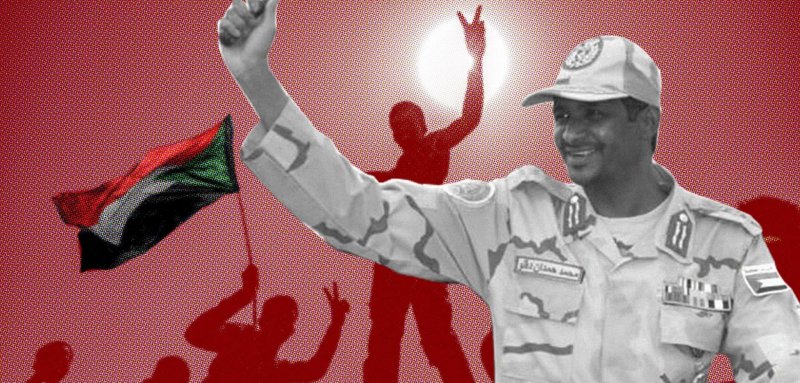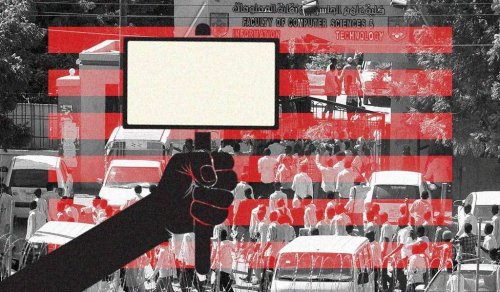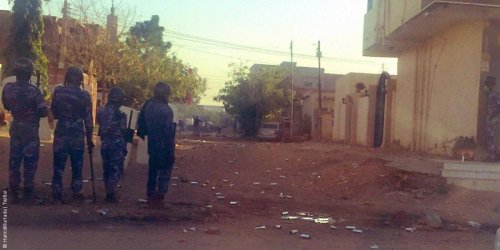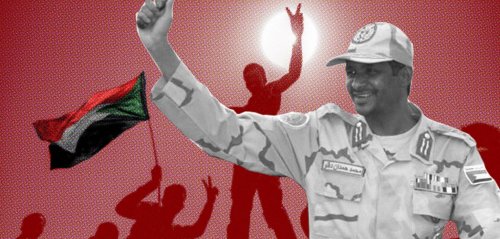‘Hemayti’ – literally “my protection” in Arabic – is how Sudan’s deposed president Omar al-Bashir once nicknamed the commander of the Rapid Support Forces (RSF), Mohamed Hamdan Daglo – now popularly known in the country as ‘Hemedti’.
In recent times however, ‘Hemedti’ has become a ‘man of change’: an active participant who is likely to shape the future course of Sudan’s revolutionary movement.
After Sudan’s popular movement succeeded in bringing an end to al-Bashir’s 30-year rule, and proceeded to follow that monumental event with the rapid overthrow of his successor Awad bin Auf (24 hours after being appointed head of the Transitional Military Council), Sudan’s new ruling authority has relatively stabilised with the formation of a new military council headed by General Abdel Fattah Burhan and his deputy Mohamed Hamdan ‘Hemedti’. Popular approval of the new governing constellation is increasing day-by-day, prompting the critical question: has the General now entered the field of politics?
Playing a pivotal role in Sudan’s change
Five months after the outbreak of the December 19 protests, Sudan’s revolutionaries commemorated the anniversary of the April 1985 uprising which toppled former President Jafaar Numeiri; the protesters broke the security cordon and overcame the attempted suppression that rained down on them – all the while defying the high Saharan temperatures – and eventually arrived at the General Command building of the Army, where they pitched tents and decided to start a sit-in until the fall of the regime.
The demonstrators would withstand the regime’s many attempts to disperse their sit-in by all available means, including the deployment of snipers and launch of daily morning assaults using live ammunition and tear gas, unperturbed; a stance which was further facilitated by the protection offered by some junior army officers.
Subsequently, the army’s high command would have to bow to the pressure of the raging popular storm, with junior officers even rebelling against the regime. Al-Bashir was accordingly removed and his first deputy, former Defence Minister Awad bin Auf, assumed power as the head of a transitional military council.
However, he too would soon follow suit and choose to step aside following the continued protests of Sudan’s protesters-cum-revolutionaries, who saw in the general little more than a shadow of the president they had just ousted. A new military council was thus formed: earning bin Auf the record of shortest ruler in the history of Sudan.
On the other hand, the role played by General ‘Hemedti’ in the events was decisive. After rumours broke out alleging that it was his forces which were assaulting the sit-in every morning, Hemedti came out with a crucial statement: announcing that his forces’ mandate was only to protect the country’s borders, and even going so far as to threaten confrontation with any parties which assaulted the people and their property. Indeed, Hemedti would subsequently back up his statement by sending his forces to the sit-in square to help protect the protesters.
New roles
After al-Bashir’s overthrow, a declaration by the head of the political committee of the military council announced that the leadership of the Rapid Support Forces (RSF) had sided with the “demands for change” – paving the way for the assumption of power by the Supreme Security Committee. The irony here was evident to many observers, who noted that the aforementioned Committee had been in fact established by al-Bashir (composed of several of the country’s armed branches: the Army, Security, Rapid Support Forces and Police) to repress the protests and disperse the sit-in.
At this point, General Hemedti refused to take up a post in the military council immediately established after the inauguration of General Awad bin Auf – instead choosing to declare his solidarity with the Sudanese people in their quest for freedom.
After bin Auf was removed, having faced the brunt of popular rejection, Hemedti returned and agreed to enter the new transitional military council. This was a clear indication of a struggle between Sudan’s generals on the form that a post-Bashir transition should take. Hemedti had already taken efforts to change many of the negative popular perceptions surrounding him, many of which linked his forces to atrocities and grave violations in the region of Darfur.
In an interview with Raseef22, Sadiq Mohamed Ismail, the vice-president of the opposition National Umma Party, praised the “heroic patriotic role” played by General Hemedti “in the interest of the Sudanese revolution,” declaring: “Were it not for ‘Hemedti’, the progress of the revolution would have faltered.”
Such an endorsement is in no small part owed to the choice made by Hemedti after his forces were summoned by al-Bashir to the centre of Khartoum to suppress the revolution. The wily general however opted to side instead with the protesters and shift the balance of power within the regime, during a critical juncture of the country’s history.
Walid Farouq, a youth leader in the Opposition Unionist Assembly (a key faction which helped lead the popular protests) views Hemedti’s actions differently, however. Speaking to Raseef22, he said that while Hemedti’s choice helped expedite the pace of change in the country, it was ultimately a pragmatic stance which allowed the general to escape what Farouq calls the “Bashir Titanic” – a sinking ship which would have otherwise taken all those onboard along with it to the bottom of the ocean.
Farouq added that the atrocities attributed to Hemedti’s forces in Darfur must also be subject to comprehensive investigations, which is necessary in order to discern whether the violations committed were of an individual nature or the consequence of direct orders by the force’s commander. Nonetheless, Farouq says that such a discussion should be postponed until such a time that the Sudanese revolution has stabilised, in order to avoid entering a war with the powerful general – one he says is feared by the military and security forces alike.
The Rapid Support Forces (RSF) led by Hemedti were originally formed out of a tribal base, with the aim of protecting and safeguarding trade caravans. In later years, however, it would evolve to play a key role in the government’s campaign to disarm its opponents. After it was incorporated into the country’s military, the RSF was assigned the task of securing the country’s borders, especially with Libya, in order to combat terrorism and illegal activities, notably human trafficking.
Charges and rebuttals
In addition to the issues surrounding the role of the RSF in the regime’s atrocities in Darfur, the force has also been charged with deploying excessive violence against the “September revolutionaries” of 2013, when approximately 195 protesters were shot dead with live ammunition.
Furthermore, four years later the governor of North Kurdufan, Ahmed Harun, would announce the removal of the RSF from the province after a citizen was killed by one of its members in November 2017 – adding to criticisms surrounding the group’s forceful conduct.
Finally, military forces were deployed last year in Khartoum as part of a campaign to “eradicate negative [social] phenomena” – patrolling the streets of the capital in four-wheel drive vehicles from which they participated in acts of torture against citizens, which reportedly included stopping young men and shaving their heads with knives. Again, the RSF was accused of being responsible for the abuses, prompting Hemedti to appear irritated on a television programme to declare that his forces were training outside of Khartoum at the time of the abuses, and charging a “fifth column” with impersonating his forces in order to smear the reputation of his units.
The 2017 killing of a Sudanese citizen in North Kurdufan was, meanwhile, described by Hemedti as an ‘isolated incident’ committed by a drunk soldier who was subsequently surrendered to the authorities and removed from service. This, Hemedti claimed, was not enough for the region’s governor Ahmed Harun, who he famously accused of seeking to politically capitalise on the event –provocatively adding that the man should be imprisoned instead of being made governor, in what was widely considered a reference to the International Criminal Court’s demand for Harun’s extradition along with other Sudanese leaders accused of war crimes.
A critical watershed
The Rapid Support Forces are estimated to number 40,000 soldiers, according to unofficial estimates, and have transformed in recent years into a vital component of the country’s military apparatus. The RSF was the driving force behind the resounding government victories against insurgent groups in Darfur, most notably the Battle of Qoz Dango against the Justice and Equality Movement (JEM) led by Gibril Ibrahim.
The force also played a considerable role in securing the triangular border region with Libya and Egypt, and is additionally deployed along the Sudanese-Chadian border and across the Eritrean frontier.
Political analyst Abu Bakr Abdel Razzaq said that Hemedti was the general most vocal in supporting political change, even prior to al-Bashir’s ouster. Abdel Razzaq goes on to insist to Raseef22 that Hemedti’s forces were not part of the repression of the recent protests, concluding with the question: “Is it logical for us to lose a leader of such stature?”
International Intersections
Shortly after the naming of Abdel Fattah Burhan and Hemedti at the head of the transitional military council, Saudi Arabia and the United Arab Emirates (UAE) rushed to congratulate the political change in Sudan, while also declaring the dispatchment of humanitarian aid (including wheat and fuel) to the poverty-stricken country.
Furthermore, in order to add greater legitimacy onto the position of the new military council, Hemedti has recently embarked on a series of meetings with Western ambassadors, notably including US chargé d'affaires Stephen Koutsis, British ambassador Irfan Siddiq, and the ambassador of the European Union delegation to Khartoum.
According to Ashraf Abdel Aziz, editor-in-chief of Sudanese newspaper ‘Al-Jarida’, the new military council enjoys very close ties with the Gulf Arab states, a reality which he said has been affirmed in the strong message sent by the military council’s decision to maintain Sudanese troops in the Saudi-led campaign in Yemen.
Abdel Aziz told Raseef22 that Burhan and Hemedti are the generals most supportive of remaining in the Saudi-UAE axis of influence at the expense of other alignments - most notably, the Turkish-Qatari axis.
Meanwhile, the relations between the country’s top two generals, according to Abdel Aziz, are strong, going back to their shared and prolonged participation in the Darfur War – where Burhan served as the head of the paramilitary Border Guard Forces which would later be integrated as a regular force under the command of the military.
Nonetheless, the insistence of the forces of the ‘Freedom and Change Declaration’ (the political coalition which spearheaded the anti-Bashir protests) on the formation of a transitional civilian government in the upcoming period (while granting the military council authority over security until elections are held at the end of the transition) has provoked anxieties in Riyadh.
However, Abdel Aziz said that the stance of the opposition forces is almost the same as the military council – with the signatory parties of the Freedom and Change Declaration strongly rejecting Qatari and Turkish interventions, which they believe would aim to reproduce the Islamists in government.
Ultimately however, at the present moment the military council is predicted to lose the battle it faces against the street and opposition, and is expected to agree to the demand for a civilian transitional government. However, this may not affect Hemedti’s future political aspirations, many observers say, with the general having moved early on to get on the revolution ‘train’.
It is important to note some of Hemedti’s credentials. The general is himself surrounded with a group of his own advisors, and leads the military force which possesses the ability to determine the internal balance of power contested by the country’s various armed institutions. Many of his forces additionally fight within the Arab Coalition in Yemen, while others play an important role within the country’s counter-terrorism apparatus.
Economically meanwhile, General Hemedti manages one of the most important gold mines in the country – Jabal Amer – and is currently studying to obtain a university degree from the Neelain University. He also enjoys strong contacts within the country’s media circles.
Ultimately, ‘Hemedti’ has today become an acceptable face for the protesters, many of whom have taken to cheering him and his forces – while many others believe him to be capable of fixing the difficult economic crisis the country has been facing by virtue of his strong international alliances; these, such observers claim, were on clear display with the Saudi and Emirati aid which entered Sudan within only a few hours of the formation of the current military council.
Based on these realities, many observers believe that ‘Hemedti’ will inescapably play a pivotal role in the crucial coming stage of the country’s history. Journalist Abdel Aziz says that he has many indicators that the general is ready to play a central role in the lives of more than 40 million Sudanese, while opposition figure Sadiq Mohamed Ismail agrees that Hemedti has the right to aspire to a political post – including the country’s presidency – after his stance in support of Sudan’s revolutionaries.
Raseef22 is a not for profit entity. Our focus is on quality journalism. Every contribution to the NasRaseef membership goes directly towards journalism production. We stand independent, not accepting corporate sponsorships, sponsored content or political funding.
Support our mission to keep Raseef22 available to all readers by clicking here!
Interested in writing with us? Check our pitch process here!







